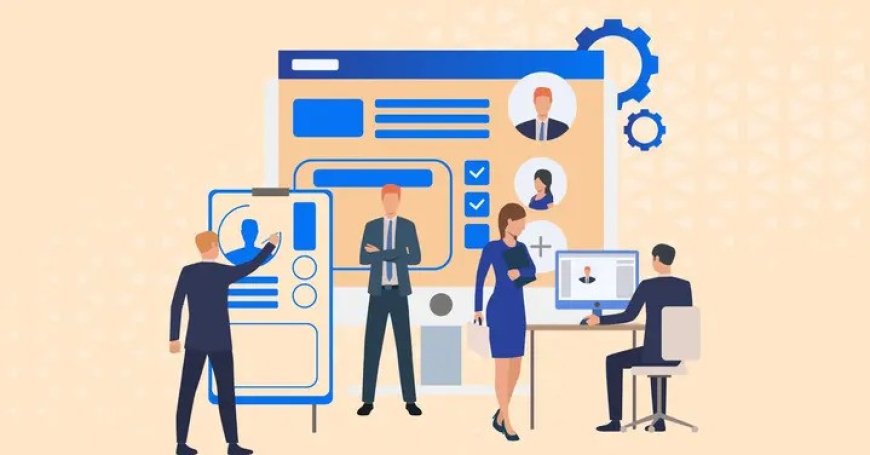AI Recruiting Software: Revolutionizing Talent Acquisition
In today’s fast-paced, technology-driven world, artificial intelligence (AI) is transforming the recruitment industry. AI recruiting software is reshaping how companies find, evaluate, and hire talent. By automating tasks such as resume screening, interview scheduling, and candidate assessments, AI allows recruiters to focus on building stronger relationships with candidates. This article delves into what AI recruiting software is, how it works, its benefits, challenges, and emerging trends in recruitment technology.

What is AI Recruiting Software?
AI recruiting software uses artificial intelligence and machine learning algorithms to streamline the hiring process. By automating repetitive tasks like screening resumes or scheduling interviews, AI helps recruiters save time and focus on more strategic decision-making. It can analyze large amounts of data, make predictions, and assist in selecting candidates most suited for the job, improving overall recruitment efficiency.
How AI Recruiting Software Works
1. Automated Resume Screening
AI recruitment software automates the review of resumes by scanning for keywords and qualifications that match the job description. This helps quickly identify top candidates, eliminating the need for manual sorting of hundreds of applications.
2. Candidate Sourcing
AI tools can search job boards, professional networks, and social media to find suitable candidates, even those who aren’t actively looking for a job. This ensures recruiters access a wider talent pool and increase the chances of finding the perfect fit.
3. Interview Scheduling
Coordinating interviews between candidates and hiring teams can be time-consuming. AI automates this process by finding mutually available time slots and scheduling interviews, reducing administrative work for recruiters.
4. Predictive Analytics for Hiring Success
AI recruiting software uses historical hiring data and patterns to predict a candidate’s success in a given role. This predictive analysis helps recruiters make data-driven hiring decisions, improving the chances of selecting candidates who will thrive in the organization.
5. Candidate Skill and Personality Assessments
AI-powered assessments help evaluate a candidate's skills, personality traits, and potential cultural fit. These assessments offer deeper insights than a resume can provide, allowing for more informed hiring decisions.
Benefits of AI Recruiting Software
1. Faster Recruitment Process
AI speeds up hiring by automating repetitive tasks like screening and scheduling, reducing time-to-hire. This allows companies to move quickly, securing top talent before competitors can.
2. Reducing Hiring Bias
AI evaluates candidates based on objective factors like qualifications, skills, and experience, helping to eliminate human biases in hiring decisions. This leads to a fairer recruitment process that focuses on merit.
3. Improved Candidate Experience
AI recruiting tools can provide real-time updates to candidates about their application status, enhancing the candidate experience. Streamlined scheduling and communication make the process smoother for applicants, leading to better engagement.
4. Data-Driven Hiring Decisions
AI tools provide detailed analytics and insights, allowing recruiters to make more informed decisions. This data-driven approach improves the quality of hires and ensures that new employees are better suited for the job and the company culture.
5. Handling High Volumes of Applications
For positions that receive a large number of applications, AI recruiting software can efficiently filter out unqualified candidates, allowing recruiters to focus on high-potential candidates.
Challenges of AI Recruiting Software
1. Data Privacy Concerns
With AI handling sensitive candidate information, data privacy and security are critical issues. Companies must ensure that their AI systems comply with regulations like GDPR to protect candidate data.
2. Algorithmic Bias
Although AI can reduce human bias, it’s still possible for AI systems to perpetuate bias if they are trained on biased data. Monitoring AI algorithms regularly is essential to ensure they remain fair and impartial.
3. Implementation Costs
For smaller businesses, the cost of implementing AI recruiting software can be high. While the long-term benefits of efficiency and better hiring decisions are clear, the initial investment may be a barrier for some companies.
Popular AI Recruiting Software Platforms
Several AI recruiting platforms are widely used to enhance the hiring process. Some of the top options include:
- HireVue: This platform leverages AI to analyze video interviews, assessing candidates’ verbal and non-verbal cues to predict their fit for a role.
- Pymetrics: Pymetrics uses neuroscience-based games and AI to evaluate candidates’ emotional and cognitive traits, matching them to roles where they are most likely to succeed.
- Greenhouse: Greenhouse integrates AI throughout the hiring process, from resume screening to candidate assessments, with a strong focus on diversity and inclusion.
Future Trends in AI Recruiting
1. Personalized Candidate Interactions
As AI continues to evolve, we can expect more personalized interactions with candidates. AI will tailor job recommendations and communication to individual candidates’ preferences, improving engagement and satisfaction throughout the recruitment process.
2. Enhanced Diversity and Inclusion
AI will play an increasingly important role in removing biased language from job descriptions and ensuring equal opportunity for all candidates. Companies will also use AI to track diversity metrics and make adjustments to improve hiring equity.
3. AI for Employee Retention
In addition to recruitment, AI will become a valuable tool for retaining employees. By analyzing data on employee performance and engagement, AI can predict which employees are at risk of leaving and suggest interventions to improve retention rates.
Conclusion
AI recruiting software is transforming how companies approach hiring, making the process faster, more efficient, and less biased. By automating time-consuming tasks and providing data-driven insights, AI enables recruiters to focus on building strong teams. While challenges such as data privacy and algorithmic bias exist, the benefits of AI in recruitment far outweigh the drawbacks. As AI technology continues to advance, we can expect even more personalized and inclusive recruitment practices in the future.
FAQs
-
What is AI recruiting software?
AI recruiting software automates tasks such as resume screening, candidate sourcing, and interview scheduling using machine learning and data analytics. -
How does AI improve diversity in hiring?
AI evaluates candidates based on objective data, reducing unconscious bias in the recruitment process. It can also identify biased language in job descriptions to promote more inclusive hiring. -
What challenges come with AI recruiting software?
Key challenges include data privacy concerns, the risk of algorithmic bias, and the high cost of implementation for smaller businesses. -
How does AI enhance the candidate experience?
AI automates communication, ensures timely updates, and streamlines scheduling, offering candidates a faster and more transparent hiring process. -
Which AI recruiting platforms are popular?
Leading AI recruiting platforms include HireVue for video interview assessments, Pymetrics for neuroscience-based candidate evaluations, and Greenhouse for data-driven and diversity-focused hiring.
What's Your Reaction?
 Like
0
Like
0
 Dislike
0
Dislike
0
 Love
0
Love
0
 Funny
0
Funny
0
 Angry
0
Angry
0
 Sad
0
Sad
0
 Wow
0
Wow
0
























































